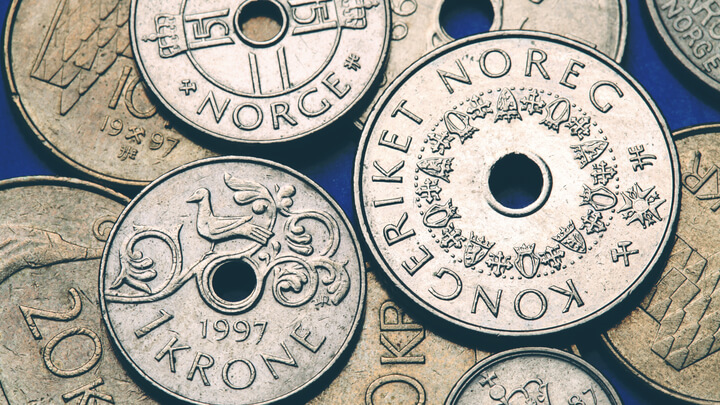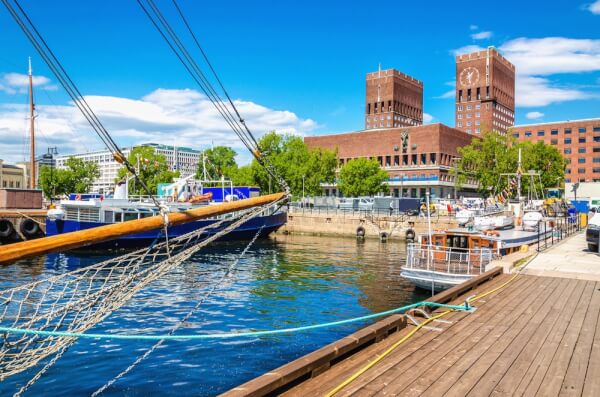Is it better to use cash or card in Norway?
Is it better to pay with cash or card in Norway? A handy guide including cash etiquette, Norwegian ATMs and using your UK card.

Picturesque fjords, Viking history and a vibrant cultural life make Norway an exciting tourist destination while the high standard of living in cosmopolitan, attractive cities is a draw for those seeking a permanent move.
Whether you’re in Norway for a brief visit or settling in for the long term, you’ll need money to get the most out of your stay. The excellent standard of living means that costs in Norway are notoriously high. You’ll certainly want to get the best deal available when exchanging your money.
This guide gives an overview of Norway’s currency and banking system, where to get cash while you’re there, and how to make sure you don’t get ripped off.
Norway uses the Norwegian Krone, which is often translated into English as ‘Crown’.
If you’re travelling through Scandinavia you’ll notice that the currency in Sweden and Denmark is also called ‘Crowns’. Unfortunately for travellers, none of the three currencies are interchangeable, so you’ll need to exchange cash separately for each country you visit.
| Krone Symbols & Names | NOK, Kr, ‘Crowns’ |
|---|---|
| NOK coins | Coins are seldom used, but are available in 1, 5, 10 and 20 Kroner denominations. |
| NOK banknotes | Banknotes are much more common, and appear in 50, 100, 200 and 500 Kroner denominations. There are also 1000 Kroner notes in circulation but there are not used so frequently and might not be accepted at some retailers. |
Norway’s colourful banknotes feature Norwegian luminaries on the front and stylised images of local nature and notable architecture on the back.
Usually other currencies such as the Euro aren’t accepted in Norway. It makes sense to carry a little local cash on you, but as cards are widely accepted (even preferred), you shouldn’t experience difficulties in paying for services here.
NOK is easily exchanged in many countries outside of Norway, so you can change up your money in advance if you prefer. However, carrying large quantities of cash is risky - many travellers choose to bring only a small amount and then use credit/debit cards or ATMs once they arrive.
If you do decide to exchange currency when you arrive, you’ll find exchange offices at the airport - although the exchange rates you’ll get likely won’t be the best in town. Similarly, it’s likely that hotel exchange rates will also be poor and include higher fees.
It’s generally best to either exchange only a small amount and then find a better deal elsewhere, or use an ATM at the airport to get NOK directly at a reasonable rate.
Major currencies such as U.S. Dollars, Euro and British Sterling are easy to exchange in Norway. Whatever currency you have in your pocket, make sure that the bills are clean and undamaged. Exchange bureaus may be reluctant to accept notes that are anything less than perfect.
Before you exchange your currency for NOK, make sure you understand the mid market rate for the currency pairing you want to change up. The mid-market is the only real exchange rate, and the one banks use when dealing with each other. It changes regularly, but should be used as a benchmark to compare with the exchange rates offered to tourists to see if the deal you’re getting is fair. You can always find the mid-market rate by using a currency converter online.
Wherever you decide to exchange your money, be aware that things aren’t always as advertised. Even if an exchange service says it takes ‘Zero Commission’ or ‘No Fees!’, they still make a profit somewhere. Expect to see their cut wrapped into the poor exchange rate they offer.
Traveller’s Cheques can be exchanged in banks or exchange bureaus in Norway. However, rates might not be as good as you would get for your cash, and your choice of exchange services will be more limited. Bank opening hours in Norway tend to be fairly short (branches regularly close by 15:00), which could be frustrating if you need cash outside that window.
With ATMs widely available and card payments the norm, Traveller’s Cheques aren’t usually worthwhile for visitors to Norway.
All major credit and debit cards are accepted in Norway. Restaurants and shops, especially in tourist areas, will accept cards readily - but some smaller retailers and petrol stations might not have the facility for card payment.
It’s worth carrying a small amount of local cash, just in case. If you need some Krone in a hurry, use one of the ATM locators from the next section to find a nearby bank machine.
If you plan on using your card abroad, tell your bank you’re travelling so they don’t accidentally block your access for unusual card activity.
When you use a credit or debit card abroad, you might be asked if you want to be charged in your home currency - this option is called Dynamic Currency Conversion (DCC). When you’re paying, it shows you the cost of the transaction, but in your home currency rather than in NOK.
Although it sounds useful, DCC isn’t a good choice for you. What happens is that the foreign bank will pick a generally unfavourable exchange rate and then likely add an additional charge. Always opt to pay in the local currency instead - your best exchange rate abroad will always be from your local bank, which means declining that DCC.
It’s easy to find an ATM in Norway. Try one of the locator tools below to find networked ATMs in the area you’re travelling to.
Visa ATM locator
MasterCard ATM locator
Amex ATM locator
Taking out cash from an ATM is a good idea for most travellers and can offer the best deal around in terms of convenience and exchange rate. However, don’t forget that both your home bank and the ATM might levy fees on your transaction - check with them before you make your first withdrawal.
It’s also a good idea to ask your home bank if they have partnerships with any local banks in Norway. If they do, you might be able to access some services (such as ATMs) for reduced or waived fees.
You may find you’re asked if you’d like the withdrawal to be charged in your home currency - this is called DCC, and it’s described in the previous section. Again, this isn’t a good choice as it can leave you exposed to hidden fees and bad exchange rates. For the best deal, always select to be charged in local currency.
Norway has a large number of banks which are traditionally split into commercial or savings banks. Commercial banks initially opened to deal with business financing, but now offer personal banking services, as well. Many banks operate online only with no physical branches.
Many of the traditional Norwegian bank chains have been merged under the larger names listed below. Some banks operate regionally, for example, but are ultimately part of the larger national (or international) institutions given in the table.
Another option, for simple access to your money abroad - and an even better deal - is to use Wise.
If you have a bank account in Norway, or know someone who does, you can transfer money between bank accounts using the real mid-market exchange rate. It's a convenient way to get your NOK cash, with no hidden fees.
*Please see terms of use and product availability for your region or visit Wise fees and pricing for the most up to date pricing and fee information.
This publication is provided for general information purposes and does not constitute legal, tax or other professional advice from Wise Payments Limited or its subsidiaries and its affiliates, and it is not intended as a substitute for obtaining advice from a financial advisor or any other professional.
We make no representations, warranties or guarantees, whether expressed or implied, that the content in the publication is accurate, complete or up to date.

Is it better to pay with cash or card in Norway? A handy guide including cash etiquette, Norwegian ATMs and using your UK card.

Few landscapes are as dramatic as Norway’s, but Oslo also boasts upscale shopping. Find out whether you can shop tax free and get VAT refund as a tourist!

One of the many delightful things about Norway is that their term for ATMs is ‘minibanks’. Whether you’re travelling there for work or play, here’s all you...

Whether you’re stopping in Oslo on your way to the fjords or have been drawn there by its rich maritime history and unique cultural vibe, don’t be surprised...